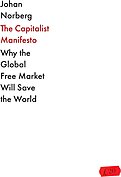Marx and Engels were right when they observed in the Communist Manifesto that free markets had in a short time created greater prosperity and more technological innovation than all previous generations combined. A century and a half later, all the evidence shows that capitalism has lifted millions and millions from hunger and poverty.
Today’s story about global capitalism, shared by right-wing and left-wing populists, but also by large sections of the political and economic establishment, does not deny that prosperity has been created, but it says it ended up in far too few hands. This in turn has made it popular to talk about the global economy as a geopolitical zero-sum game, where we have to fight to control new innovations, introduce trade barriers and renationalize value chains. While, more broadly, capitalism is accused of fueling glaring inequality, populist revolts, climate change and China’s global conquest.
In this incisive and passionate investigation, Johan Norberg instead states the case for capitalism and the vital role played by the free market in today’s uncertain world. Ultimately, he argues that a move away from global capitalism would not only squeeze the growth out of the economy but also deepen an already large social exclusion for the vulnerable — for the world’s poor, it would be a killing blow.
The Capitalist Manifesto
Why the Global Free Market Will Save the World
Featured Event
The Capitalist Manifesto: Why the Global Free Market Will Save the World
Globalization has come under fire over the past two decades as the world has lived through an international financial crisis, terrorist attacks, a pandemic, and the return of war in Europe. Join a panel of experts on September 25 for a discussion.
Praise for the Book
“The Capitalist Manifesto is a wonderfully timely, entertaining and inspiring defense of free markets and free trade against the current critics in both political parties. Besides debunking the gloomy myths dominating headlines and politics, Norberg’s rigorous analysis of recent data shows that people are not only healthier and wealthier but also happier in America and other countries enjoying the unprecedented benefits of economic freedom.”
— John Tierney, senior fellow at the Manhattan Institute, contributing editor to City Journal, and Hayek Book Prize jury chair.
About the Author
Johan Norberg is a senior fellow at the Cato Institute and a writer who focuses on globalization, human progress and intellectual history. Norberg is the author and editor of more than 20 books, translated into more than 30 languages. They include In Defense of Global Capitalism, Progress: Ten Reasons to Look Forward to the Future, and Open: The Story of Human Progress. Both latter books were named by The Economist as a book of the year in 2016 and 2020 respectively.

